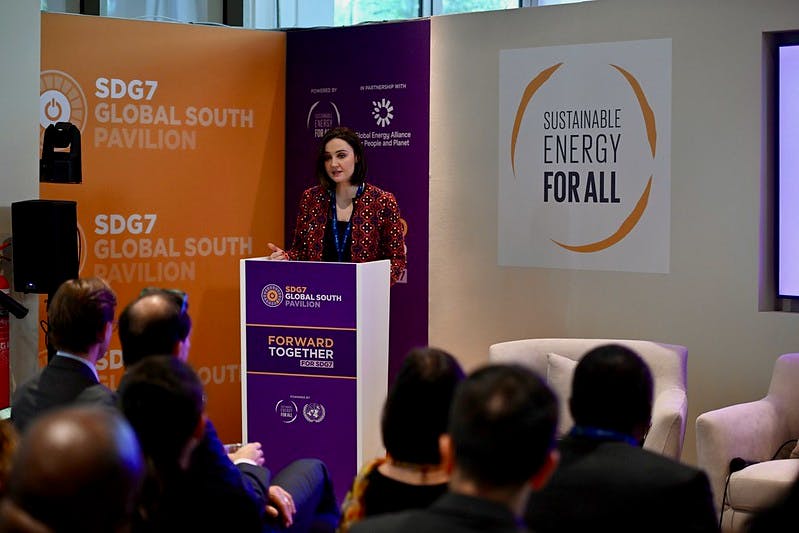On 6 December 2023, Sustainable Energy for All (SEforALL) announced the release of the Green Hydrogen Catalogue to the 24/7 Carbon-Free Energy (CFE) Compact at the SDG7 Pavilion at COP28 held in the United Arab Emirates. The session showcased the integration of the Green Hydrogen Catalogue into the 24/7 CFE Compact, and discussed the key role of policies and regulatory frameworks that enable the adoption and integration of green hydrogen into energy systems.
On 6 December 2023, Sustainable Energy for All (SEforALL) announced the release of the Green Hydrogen Catalogue to the 24/7 Carbon-Free Energy (CFE) Compact at the SDG7 Pavilion at COP28 held in the United Arab Emirates. The session showcased the integration of the Green Hydrogen Catalogue into the 24/7 CFE Compact, and discussed the key role of policies and regulatory frameworks that enable the adoption and integration of green hydrogen into energy systems.
“The catalogue, facilitating collaboration among governments, international organizations, and private sector entities involved in the green hydrogen value chain, has been released to align with the 24/7 Carbon-Free Energy Compact. This strategic move aims to further propel the global conversation on green hydrogen as a pivotal technology in establishing a reliable and continuous carbon-free power source.”
– Mohamed Ali Zerouali, (Chief Development Officer Middle-East, Africa / Vice President African Commission at CGEM / Co-President International Commission at Moroccan Green H2 Cluster / Member of CEET to UN Secretary General)
Speakers included -
- Mairi McAllan, Cabinet Secretary for Net Zero and Just Transition, Scotland
- Petra Schwager, Chief of the Climate and Technology Partnership (CTP) Division, Global Programme for Hydrogen in Industry, UNIDO
- Isaac Kiva, Secretary for Renewable Energy, Ministry of Energy and Petroleum, Republic of Kenya Rosilena Riggs Lindo, Minister of Energy, Panama
- Thorsten Herdan, CEO, HIF EMEA
- Wilson Ricks, PhD candidate Department of Mechanical and Aerospace Engineering, Princeton University
The speakers discussed the developments, national targets and benefits of green hydrogen as part of the panel discussion. Here are some of the key takeaways:
- Scotland is committed to producing renewable hydrogen, both green and blue with CCUS, as a key component in achieving its net-zero emissions target by 2045. Scotland has the potential to produce over 3 million tons of green hydrogen per year by 2045, with up to 2.5 million tons for export.
- UNIDO has identified the key enablers, such as policy, to expedite the adoption of hydrogen usage to locally drive industrial development. On December 10, in collaboration with IRENA, UNIDO launched a guiding book leading to top policy training, aligning industrial development policies with hydrogen development policies.
- Kenya aims to produce green hydrogen for various applications, including fertilizer production, energy storage, transportation, and industrial use, and displace 50% of imported fertilizer with green alternatives by 2032 and is collaborating with partners to achieve this goal.
- Panama has specific laws in place that provide fiscal incentives for renewable energy projects, and they are currently drafting a bill to extend these incentives to green hydrogen infrastructure. Panama has a goal of supplying at least 5% of its maritime fuels from green hydrogen by 2030, and is committed to developing the regulations and legal framework necessary to support its green hydrogen industry.
The challenges faced by the shift towards green hydrogen were also discussed and raised by panelists such as, Thorsten Herdan and Wilson Ricks:
- Differentiation is needed: Hydrogen and hydrogen derivatives serve different purposes and should be treated differently. For example, steel manufacturing requires hydrogen, while aviation and shipping rely on derivatives.
- Challenges in transitioning from plans to projects: Financial hurdles exist due to a lack of final investment decisions, often stemming from unclear requirements. This is particularly prominent in Europe, where despite renewable potential, the market lacks the clarity needed for infrastructure development.
- Importance of a clear European market: Without a clear European market, the potential for renewables deployment in the global South and developing countries might not be fully realized.
Find out more information about the Green Hydrogen Catalogue
The Green Hydrogen Catalogue provides a platform for collaboration between governments, international organizations, and private sector companies involved in the green hydrogen value chain to take action towards achieving carbon-free energy for all.


Green Hydrogen represents a unique opportunity for the clean energy transition. Climate change is an existential threat to a sustainable future, but at the same time, facing up to the climate challenge is an opportunity to promote prosperity and a brighter future for all. Green hydrogen and its derivatives will play a vital role in the just energy transition.

Today, at the United Nations Climate Change Conference of the Parties (COP28), the White House Council on Environmental Quality (CEQ) announced that the United States Government has joined the United Nations (UN) 24/7 Carbon-Free Energy (CFE) Compact.
